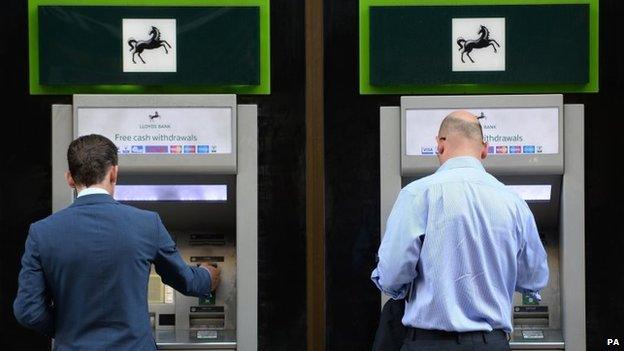Analysis: The dangers of the Lloyds plan
- Published

Last week, the Conservatives offered a revamp of Right to Buy. Now they have announced another plan with echoes of the 1980s: Selling some of the remaining state-owned shares in the Lloyds Banking Group to the public.
UK residents (and military personnel abroad) will be able to put between £250 and £10,000 into shares. They would get a discount of "at least 5%" as well as "a loyalty bonus for people who hold on to their shares for a year".
David Cameron said: "Today's announcement marks another step in the long journey we have been making repairing our banks, turning our economy around and reducing our national debt."
But there are dangers worth considering in the Tory plan. There is little clamour for the state to hold on to the banks, but should the sale be targeted at kitchen-table investors? Here are some reasons for caution.
The first is that bank equity is a super-complex financial product. Modern banks trade in things that are impossibly difficult to follow from the outside. They are also accident-prone.
Lloyds Banking Group is not British Telecom. That all makes scrutiny by shareholders both harder and more important. Retail investors, with only small stakes in the company, may not be able to put the time into it. It might not pay for them to bother.
And with a small portion of shares, they would not be able to force the bank to simplify.
So having more small shareholders would probably mean the bank is more easily "captured" by its management. That is to say, it will start serving its employees rather than its owners and customers. That would be extremely bad for everyone.
That might not just mean mega-bonuses, which are easy to spot, nor simply unjustifiably high pay. The bank could be very badly run. And the shareholders might only find out when it all gets too late.
Indeed, the second reason for concern is what might happen if it does run into trouble. Shareholders provide the risk capital for companies. Dividends are payment for the risk of getting wiped out when the bank makes big losses.
It is important that shareholders lose their shirts when everything goes wrong. During the crisis, taxpayers bailed out lots of people, but the authorities were at least bold enough to wipe out the bank shareholders who failed to keep their executives on the straight and narrow.
Almost all governments felt, however, that they could not wipe out retail investors in banks. Depositors, even rich ones putting money into uninsured high-risk accounts, were always saved.
'Encouraging recklessness'
So imagine what would happen if the bank was part-owned by such savers who took advantage of a government offer to buy bank shares? It would take bravery on the part of any government to resist calls for a bail-out that took in shareholders.
After all, the government would have encouraged shareholders to invest in the product with discounts and advertising. This is a policy that could make it much harder for the authorities to do the right thing in a pinch.
You've heard of banks being "too big to fail"? This could make Lloyds potentially "too politically sensitive to fail". And if big investors - other banks and funds - were to believe that, it could mean that they will lend to the bank more cheaply than other banks.
The City might think that the government is secretly supporting Lloyds and that would have all sorts of effects - including encouraging recklessness by the bank itself.
Third, remember that enticing retail investors costs money. The government would forgo money to arrange this state of affairs when it might be better to have the public own shares via their pension funds.
And the beneficiaries of this state of affairs would be well off. They would get a 5% discount, but would need to find the remaining 95%. All these risks for people to give a boost to people with cash to spare.
All in all, a lot of questions worthy weighing about this policy.
There is a lot to be said for getting assets into the hands of the public. But banks are definitely riskier vehicles for mass shareholder capitalism than telephone companies.
- Published19 April 2015
